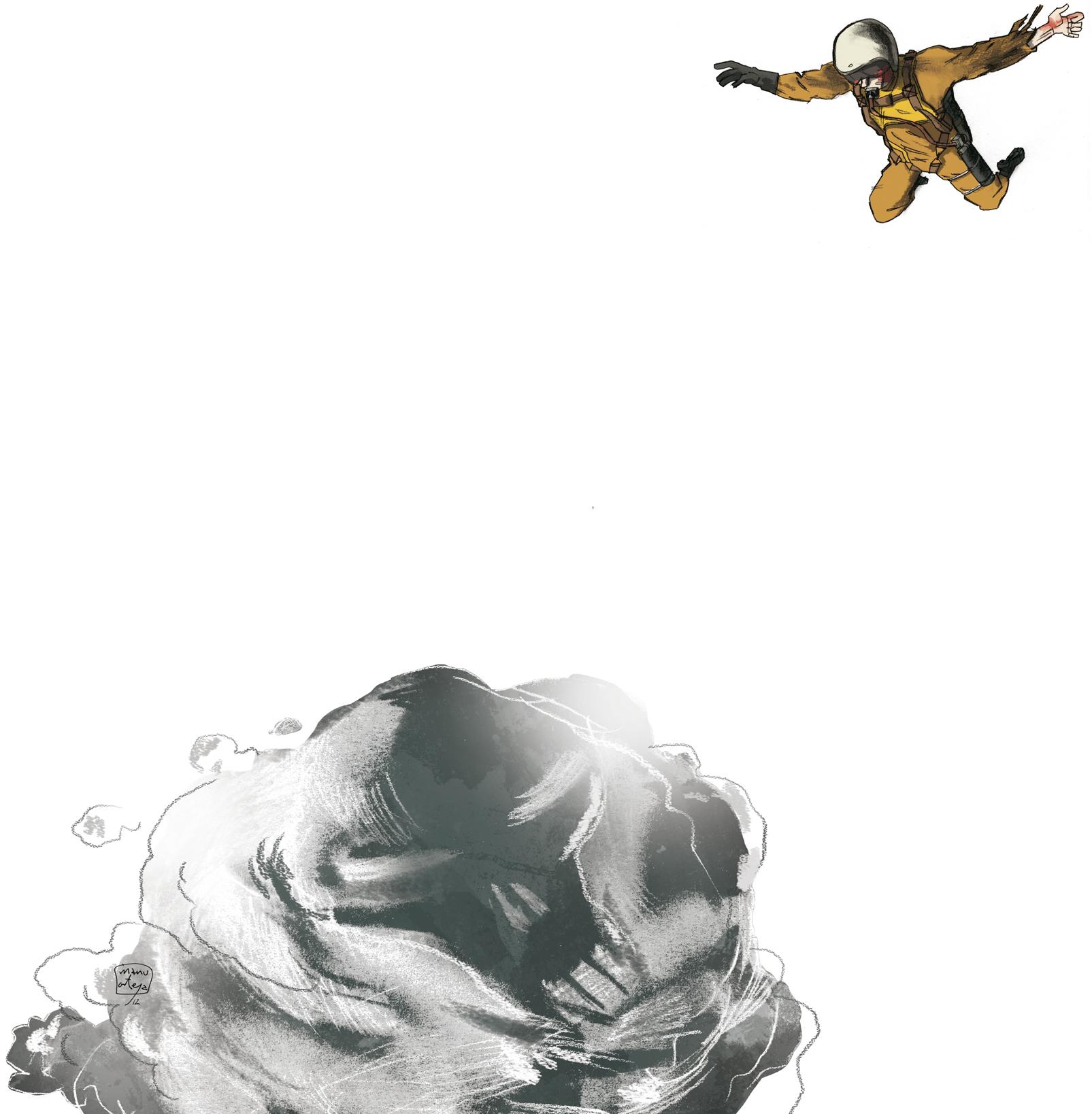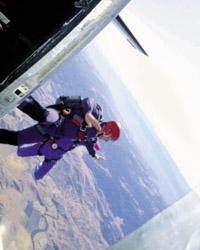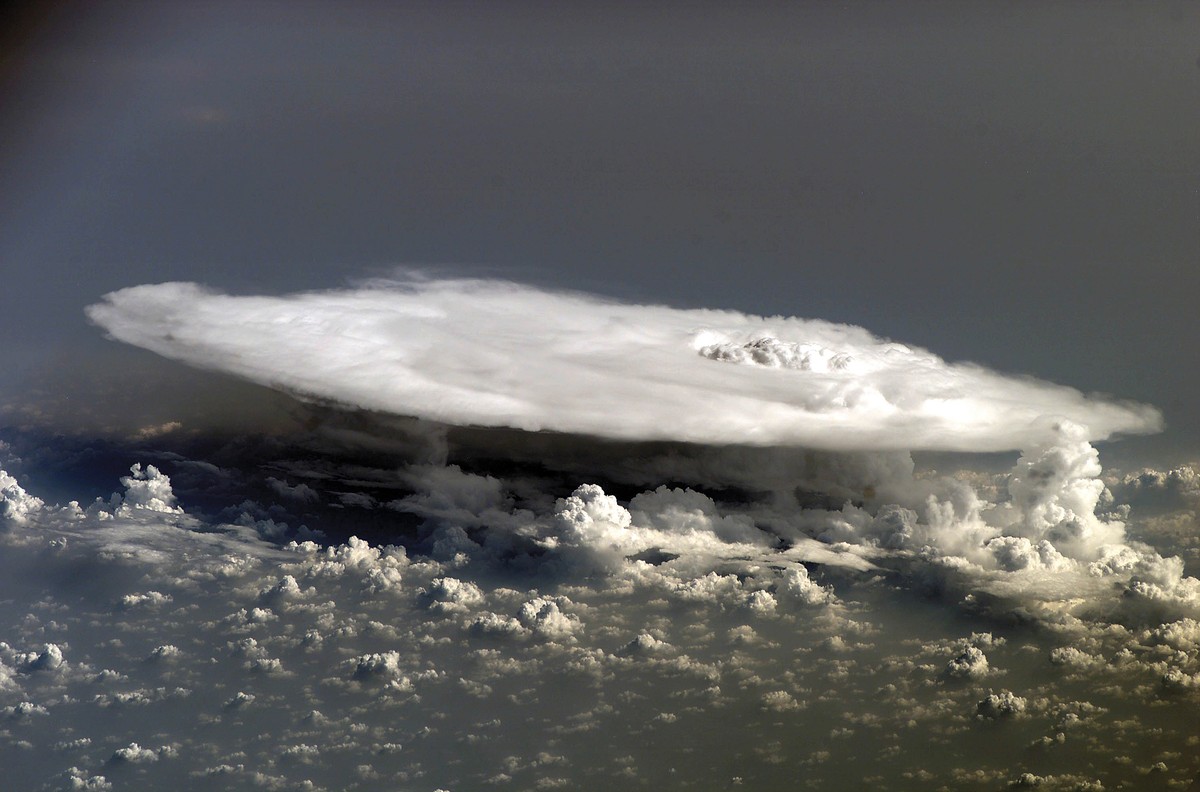Down in the cumulominbo
2013/02/01 Etxebeste Aduriz, Egoitz - Elhuyar Zientzia Iturria: Elhuyar aldizkaria

I had to jump. I knew the height was excessive and it was very dangerous without pressure clothing. I knew that in the lower cumulonimbo there would be a huge storm. But the engine of the plane spoiled. I had no choice.
When he headed with the F-8 to South Carolina, he didn't think there could be danger. The prediction pointed to storms, but for an F-8 that was not a problem: I could avoid the storm by deviating or passing over. He did. When he saw that huge cumulombo that was not lacking much for the arrival, he went up to 16,000 meters to pass over. And when I was on that cloud the alarms soared. He tried to control the plane, but in vain he was descending.
Sit well on the chair, with the legs fixed on the floor, straight back, a watch look, 6.00 p.m., hands on the handles to activate the ejection system and come on! It was launched outside by an explosion. He felt a violent blow and transmitted the pain in the body. And cold. It went from 20 to -50ºC. It was freezing. He felt cold burning faces, necklaces, wrists, waist and ankles; he felt he was on fire. And decompression was unbearable. He was inflating his belly, puffing and inflating, and thought that it was going to explode and that his eyes were going to come out of his orbits and he was going to break his head into a thousand pieces; he also had to explode his ears and cramps throughout his body. He never knew that pain. He saw clearly that he did not leave.
After a few seconds he began to enter the first light mists and felt a euphoria that, in short, remained conscious! "Courage! --se auto-- You can still get it. You are thinking. You are conscious. He knows what is coming. This free fall has been maintained and executed."
He realized that he was going back and forth, with his arms and legs open, like a crazy mill, now vertical, now horizontal, or diagonal. He could not move his hands and legs; force g was too large. And something on your face, not stopping. "Oxygen mask! God, I almost forgot it!" He was glad not to lose the mask.
Until then he kept up with the oxygen he had in the blood, but soon he would need it to remain conscious and not damage the brain. Up to 3000 m of free fall, at that height the parachute would open automatically and could breathe normally. But in the meantime? Or if the automatic parachute mechanism fails and was unable to pull the hoop unconscious? "You have to get that mask!" He kept trying to move his hands, but in vain.
I had no parts of the body without pain. Realizing it he calmed down. He was still conscious and wanted to continue above all else. "Resist. It goes well. It continues. Well, well, well. You are still aware. Not much is missing. You fall into the denser air. More oxygen, less decompression, less pain."
It entered between compact white and grey clouds. And he could move his hands. With the right he took the oxygen mask and took it to the face. He placed his left on the helmet. He began to feel better. He was almost certain that he would survive. Good news for high-altitude drivers: "We are able to withstand a decompression of 14,000 m. Equal to 15,000. But I will say 14,000 and the last thing I saw in altimeter before I jump."
He felt the desire to open the parachute. It did not rely entirely on the automatic system. He took his hand to the hoop, but, "What are you, crazy! "Do you want to die frozen for slowing with the parachute?" And oxygen? It does not last more than five minutes, perhaps three. Free fall, Bill, free fall."
He noticed something down on his face, across his neck, frozen. Blood. He made blood through his eyes, nose, mouth, and ears. And the clouds were getting black. He lost all references in the dark: he didn't know if he was spinning, he was going upside down... I wanted to open the parachute. Elapsed time. Watch. It was not easy to see. It seemed to him at six and four or five. Start making calculations. Didn't the parachute have to be opened? And with that fog that did not allow to see anything, if it was already a few meters, about to hit the earth?
I would wait a little longer. Fifteen seconds, half a minute, perhaps a minute. Blows on the body of small stones. He remembers the Kumulonimboa. These stones could be hail, frozen drops of water as storms rise up. "Freezing point of rain? It has at least 3,000 m or more. Well. Follow us on the free fall. Resist." He closed his eyes.
Parachute. I had to open it. He took his hand to the ring and when he was going to pull, he felt a jerk. It opened automatically! I wanted to see a parachute, but no, it was darker than I thought. But I felt it was okay, it was the same feeling as when I jumped in Korea. "In about ten minutes down. Outstanding. Everything goes well. It has a good parachute. You are fine. We are aware. You have survived." He felt wonderful.
Turbulence. And he started in a crazy dance: he stopped falling, a feeling of weightlessness, then up and down. The winds danced. But it was not uncomfortable.
He heard a massive explosion, blinded a sudden glow and a hum put his whole body to tremble. Thunder before listening felt. He thought that if it were not for the helmet that protected his ears, the eardrums would burst. And the rays were not as seen from the earth. They were everywhere and had every imaginable form. The nearest saw them as giant bluish sheets of several meters thick, sometimes paired, like a scissor, and felt that they were going to divide into two. And behind every ray, total darkness. Lost in black.
Lightning lit the parachute. The effect was such that he thought he was dead. At the sight of that dome, he felt that he was in a gently lit church. "Maybe this is. So it begins after the month. Dead, Bill. Finished."
But the storm followed. And it seemed that it would never end. He looked at the clock: 6:20 p.m. "My God, on earth I needed at least ten minutes! You are trapped!"
It rained without stopping. Sometimes there was so much water that when breathing water came in. He drowned. "This is a mark where when you find your body hanging on a tree, your lungs full of water, you won't be able to understand how we were drowned on the ground!" And then hail. Stone. A symphony of hammers to the body. He did not know the size of the stones, he could not see them, he dared not open his eyes. But they were hard.
Gradually, the air was softer and the rain pleasant. He felt he was closer to the earth. And he saw a piece of green among the mists. I was going to land. "Now don't do it right. Watch the speed. Don't worry now, after all this, with a bad landing."
The parachute gets stuck in the trees and goes against a trunk of head. But he was able to go down. Watch: 6:40 p.m. He fell on the ground.
PS: This is the story of pilot William Rankin in July 1959, based on the book The Man Who Road the Thunder, written by the Ranking itself.

Gai honi buruzko eduki gehiago
Elhuyarrek garatutako teknologia





